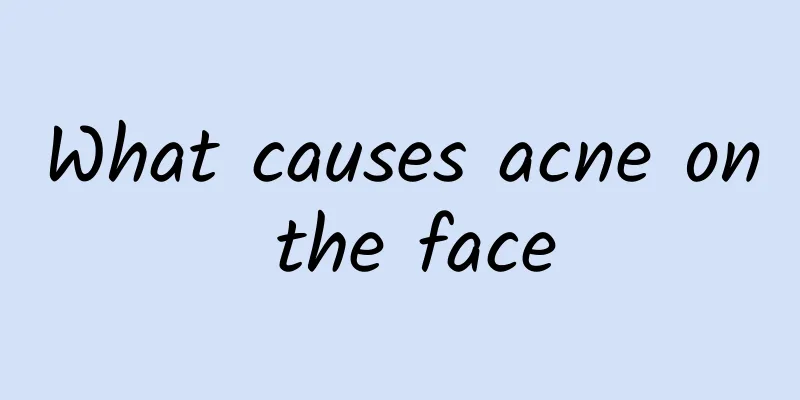What causes acne on the face

|
Acne vulgaris is actually what we often call acne. During adolescence, our hair follicles become clogged due to hormones in our bodies, making us more susceptible to acne, also known as pimples. Generally speaking, acne will improve after puberty. But some people have a lot of acne on their faces. What causes this? In order to help everyone better understand acne, let us now understand the causes of acne. Causes The occurrence of acne is closely related to factors such as excessive sebum secretion, blockage of the sebaceous gland ducts of the hair follicles, bacterial infection and inflammatory response. After entering puberty, the level of androgens, especially testosterone, in the human body increases rapidly, promoting the development of sebaceous glands and producing a large amount of sebum. At the same time, abnormal keratinization of the sebaceous gland ducts of the hair follicles causes blockage of the ducts, hindering the excretion of sebum and forming keratin plugs, also known as micro-acne. Various microorganisms, especially Propionibacterium acnes, multiply in large numbers in the hair follicles. The lipase produced by Propionibacterium acnes breaks down sebum to produce free fatty acids, while also attracting inflammatory cells and mediators, ultimately inducing and aggravating the inflammatory response. Clinical manifestations Skin lesions often occur on the face and upper chest and back. Non-inflammatory lesions of acne appear as open and closed comedones. The typical skin lesions of closed comedones (also known as whiteheads) are skin-colored papules about 1 mm in size with no obvious hair follicle openings. Open comedones (also called blackheads) appear as dome-shaped papules with significantly enlarged follicular openings. Acne will further develop into various inflammatory skin lesions, manifesting as inflammatory papules, pustules, nodules and cysts. Inflammatory papules are red and vary in diameter from 1 to 5 mm; pustules are uniform in size and filled with white pus; nodules are larger than 5 mm in diameter and feel hard and painful to the touch; cysts are located deeper and are filled with a mixture of pus and blood. These lesions may also fuse to form large inflammatory plaques and sinus tracts. After the inflammatory skin lesions subside, pigmentation, persistent erythema, and depressed or hypertrophic scars are often left behind. Clinically, acne is divided into 3 degrees and 4 levels according to the nature and severity of acne lesions: Level 1 (mild): only comedones; Level 2 (moderate): in addition to comedones, there are also some inflammatory papules; Level 3 (moderate): in addition to comedones, there are also more inflammatory papules or pustules; Level 4 (severe): in addition to comedones, inflammatory papules and pustules, there are also nodules, cysts or scars. treat 1. Daily care Wash your face with warm water once or twice a day to clean your skin, and avoid squeezing or scratching skin lesions with your hands. Avoid using oily and powdery cosmetics and ointments and creams containing glucocorticoids. 2. Common methods of acne treatment (1) Topical medications: Retinoic acid (retinoic acid cream, adapalene gel, tazarotene gel), benzoyl peroxide, antibiotics (clindamycin, erythromycin, chloramphenicol, etc.), azelaic acid, sulfur lotion, etc. (2) The first choice of oral antibiotics is tetracycline (minocycline, doxycycline, etc.), followed by macrolides (erythromycin). Avoid antibiotics commonly used to treat systemic infections such as levofloxacin. The course of antibiotics is usually 6 to 12 weeks. (3) Oral isotretinoin For severe acne, oral isotretinoin is the standard treatment and currently the most effective method for treating acne. The treatment course aims to achieve a minimum cumulative dose of 60 mg/kg. (4) Anti-androgen therapy, such as the oral contraceptive cyproterone acetate combined tablets, is suitable for female patients with moderate to severe acne accompanied by symptoms of excessive androgen levels (such as hirsutism, seborrhea, etc.) or polycystic ovary syndrome. Female patients with delayed-onset acne and acne that is significantly aggravated before menstruation may also consider using oral contraceptives. (5) Oral glucocorticoids are mainly used for fulminant or aggregated acne, following the principles of short-term, low-dose, and combined with other methods. (6) For patients who cannot tolerate or are unwilling to receive drug treatment, physical therapy such as photodynamic therapy (PDT), fruit acid therapy, laser therapy, etc. can also be considered. |
<<: What ointment should I use for acne on my face?
>>: What causes low cardiac enzymes?
Recommend
Herpes treatment, herpes can be cured quickly in this way
Herpes is a common skin disease, which is general...
The efficacy and function of walnut diaphragm
When eating walnuts, you should have noticed the ...
What are the traditional Chinese medicine decoctions for spleen deficiency?
Traditional Chinese medicine believes that childr...
Can I eat watermelon after eating peach?
Peaches and watermelons are both common fruits in...
What to eat for hepatitis
Hepatitis is a very common disease. Such a diseas...
What to do if your nose is blocked by mucus
A runny nose often causes nasal congestion, which...
The benefits of drinking corn silk boiled water
Corn must be familiar to everyone. In the past, p...
What should I do if my baby’s umbilical cord is bleeding at ten days old?
The umbilical cord is the bridge that connects the...
The efficacy of Chinese potherb mustard is high in value
No matter what kind of Chinese medicine it is, it...
What is the reason for anal itching
The anus is a part mainly composed of sphincters,...
Chinese medicine foot bath improves cold hands and feet
Now more and more people are beginning to pay att...
Which department should I go to if I have diarrhea?
When you go to the hospital for treatment, you mu...
Can mild hypoxic-ischemic encephalopathy in newborns be cured?
Newborns are prone to ischemic encephalopathy, wh...
What should I do if my baby's face is broken?
Nowadays, many mothers are eager to play with the...
Why can water be squeezed out of the nipples when they are itchy?
Good health is the wish of most people, but in mod...









